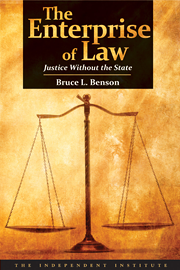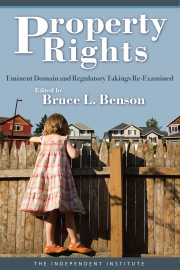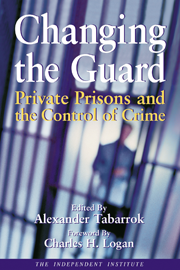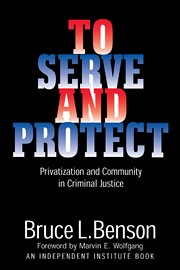The legal scholar Lon Fuller defined law as “the enterprise of subjecting human conduct to the governance of rules.”1 It includes basic rules of conduct as well as institutions or mechanisms for clarifying, changing, and applying the rules. Furthermore, as David Hume observed almost two and a half centuries ago, a primary motivation for developing rules and governing institutions is the attempt by rational individuals to find ways to expand their personal well-being or wealth in the face of scarcity.2 But, as Franz Oppenheimer explained, there are two ways for individuals to expand their wealth: “economic” processes, which consist of cooperative voluntary interaction, including production and trade; and “political” processes, which take wealth produced by others through the use or threat of force (or guile).3 Understanding the evolution of law requires recognition of the conflicting incentives to establish rules for the purpose of creating wealth versus rules for the purpose of expropriating it.
Wealth-Seeking and the Evolution of Law
How can law evolve from self-interest? Competition over the use of scarce resources is inevitable. Unilateral efforts to turn a property claim into actual ownership requires a sufficiently strong threat of violence to exclude others from making conflicting claims. Since several individuals are likely to have similar incentives with regard to any scarce resource, violent competition could consume vast amounts of resources. Is such a Hobbesian “war of all against all” inevitable? No. For instance, individuals with similar capacities for violence (and therefore small expectations of winning a war) might agree to recognize an equal initial distribution of private-property rights to scarce resources. The incentives to live up to that agreement are largely positive: as a result of reciprocal commitments to respect property claims, individuals expect to grow richer by focusing resources on productive activities rather than on protective or aggressive activities.
Of course, a Hobbesian war can arise if some parties believe they are probably strong enough to take more wealth. But historical and anthropological evidence suggests that the earliest men lived in groups that were largely cooperative.4 This is not surprising since people’s capacity for violence was probably similar until wealth began to accumulate; thus, mutual deterrence tended to prevent the taking of resources, leaving cooperation as the only potential means of increasing wealth.
Even when one party’s capacity for violence is substantially greater than that of others, continual violent conflict is still not likely to occur. Indeed, if an individual has an absolute advantage in violence, he will be in a position to induce others to accept slavery, thus concentrating all property rights (including the ownership of other persons) and wealth in the hands of that one “authority.” Of course, he will also have to maintain his position of dominance to assure continuation of that uneven distribution of rights and wealth. After all, the slaves’ incentives to accept the situation are “negative”—they accept subjugation only when they expect it to be better than the high-probability alternative of losing everything.
Between the extremes of voluntary agreements and slavery many other nonviolent possibilities exist. Those possibilities entail forms of extortion, or “protection” from the very individuals demanding payment rather than from other threats. Some protection rackets involve large payments (for example, tribute or taxes), while others are characterized by dispersed private-property rights and modest payments to someone with a comparative advantage in violence.
It may well be that a person choosing to pay for “protection” could produce sufficient counterforce to overthrow the extortionist. But if the payment demanded is not too great, an individual capable of producing considerable wealth could decide that the cost of counterforce is too high to make it worthwhile. But if so, the extortionist is constrained in how much he can demand.
Let’s consider a spontaneously evolving voluntary legal order before turning to the implications of extortion and law.
Law Through Cooperative Institutions
Voluntarily recognized “trust rules,” to use Viktor Vanberg and James Buchanan’s terminology, essentially involve explicit or implicit agreements to adopt predictable patterns of behavior, or norms, in dealing with a limited number of identified individuals.5 Since the primary source of conflict is scarcity, trust rules focus on the allocation of property. Each individual better secures his property claims by accepting an obligation to respect the property rights of others, who of course are expected to reciprocate. As this occurs, people can make plans over longer periods and get the highest return from their resources.
But how does governance occur? Imagine an evolutionary process in which individuals recognize the high cost of unilateral violence as a means of establishing property rights. Individuals with similar capacities for violence and facing the likelihood of repeated dealings (for example, with neighbors) will form tentative bilateral relationships that include promises to recognize each other’s property boundaries. If individuals significantly benefit from a continuing relationship, a violation of a rule can be “corrected” through the so-called “tit-for-tat” strategy. Essentially, the wronged party responds in a similar fashion (so the response need not be violent) in the next round in order to punish the wrongdoer, but then signals a willingness to return to behavior consistent with the rules if the original violator will do the same. The rule violator sees that if he wants the benefits from ongoing cooperation he must follow the rules.
Another option, when there are competitive alternatives, is to simply refuse to deal again with someone who has proven himself untrustworthy. As more bilateral relationships are formed and a loose-knit group with more elaborate reciprocal dealings develops, such competition arises. Thus, individuals can cooperate unconditionally with anyone known to be trustworthy, while refusing to deal with anyone known to have violated a trust rule with anyone in the group. If information spreads quickly and everyone spontaneously responds to a rule violation, the violator is excluded from interaction with all members of the community. Social ostracism is the result, and it can be a significant punishment. In fact, an individual’s incentives to exact physical punishment are weak when competitive alternatives to the violator exist and information is easily spread. Investments in communication mechanisms substitute for investments in the capacity for personal violence. Indeed, Vanberg and Buchanan explain that once a group is formed based on intermeshing bilateral trust rules, “solidarity rules” (obligations that are expected to be upheld because everyone benefits) can also develop.
Solidarity rules include “inform your neighbors about individuals who violate trust rules” and “boycott untrustworthy individuals.” They evolve spontaneously as individuals substitute ostracism for violence. Related rules, such as “look out for your neighbor” and “inform everyone when a rights violation occurs,” tend to follow, and multilateral cooperative policing to insure property rights ultimately evolves. Members of close-knit groups often do things to prevent theft against fellow members and cooperate in pursuit and prosecution when a theft occurs.6 Individuals who do not follow solidarity rules (for example, who do not contribute to cooperative policing) may also be ostracized, so free-rider problems are not significant.
Threats and sanctions are not the primary incentives to recognize rules in an evolving cooperative group. Important positive incentives also develop. Unexpected drastic losses of wealth (from fires, storms, accidental death of the breadwinner) can create incentives to turn to theft. To avoid this, a group may establish insurance arrangements to protect people from occurrences that might force them to steal in order to survive. Self-interested individuals will voluntarily help someone in distress in order to encourage him to continue respecting their property rights. They might do so with the reciprocal assurance that they can receive help if they need it in the future.
Other institutional arrangements also evolve. Because policing is imperfect, someone accused of a rule violation may not be guilty and may dispute the charge. In such an event, “prosecution” could be violent, but in a close-knit group violence can have significant costs, particularly if opinions about guilt are mixed. Those costs can be reduced by developing nonviolent means of resolving disagreements and clarifying property rights, and by making acceptance of a judgment relatively attractive for the loser.
For instance, a mutually acceptable mediator or arbitrator might be chosen from among the most reputable members of the community or from a pool of dispute-resolution specialists. Since this third party must be acceptable to both disputants, “fairness” is embodied in the dispute-resolution process. The loser might also be allowed to buy his way back into the community by paying appropriate restitution, rather than being subject to physical punishment or exclusion. Of course, rulings can be backed by threats of ostracism, but in general, resolutions are likely to be accepted because even losers recognize that the long-term benefits of behaving according to expectations probably exceed restitution payments (or the costs of exclusion). Many historical and anthropological studies demonstrate that restitution and voluntary mediation or arbitration are common institutions in the legal systems of close-knit groups.7
All such institutional developments tend to be spontaneous and unplanned. The result is a movement toward increasingly secure private property rights under “customary law.” Indeed, as Robert Ellickson writes, “There is abundant evidence that a . . . group need not make a conscious decision to establish private property rights. . . . People who repeatedly interact can generate institutions through communication, monitoring, and sanctioning.”8 Thus, no central authority with coercive powers is necessary to produce law in such a cooperative social order. Coercion is only required when there are strong incentives to resist, generally because the law grossly discriminates between individuals or groups in the allocation of rights and wealth.
Extortion and the Evolution of Law
Suppose an individual is better than others at wielding violence and chooses to take the wealth produced by them. The result is a “negative sum” undertaking since the forcible transfer and any efforts to resist it consume resources that could be used to create new wealth. Nonetheless, such an individual may expect to be better off by appropriating wealth than by cooperating, producing, and trading.
Obviously, that person will develop a reputation for using violence. The reputation can be valuable because the mere threat of violence may be sufficient to obtain wealth. Once such a reputation develops, however, his potential for entering cooperative relationships is reduced, since anyone with whom he does not have a prior trust arrangement will doubt his word. Therefore, the decision to take wealth often involves a permanent commitment to extortionist behavior. Moreover, he will wish to establish an environment that will produce a steady income. He will establish rules and institutions to minimize the costs of continual extortion. Among other things, this implies the extortionist will attempt to establish a monopoly in violence. After all, if a victim can find some person or cooperative group to protect him, the extortionist’s ability to extract wealth will be severely limited. Thus, the extortionist must erect barriers to keep people from escaping his “jurisdiction.”
The scale of violence required to compete for and maintain power will be greater than any single individual can produce, of course. Therefore, an “entrepreneur” in extortion will generally establish a “firm,” which will use part of the seized wealth to buy services from others who have a comparative advantage in violence but less entrepreneurial skill. (These will include strong-arm enforcers, army or police personnel, and producers of the tools and symbols of violence.) Such “protection firms” will require internal cooperation, so the dealings between people within the firm will differ from the dealings with the targets of extortion. Many cases of organized aggression involved cooperative communities with established trust relationships, such as those described above, that were persuaded by an entrepreneurial leader (for example, a tribal war chief) that they could get rich through raids or conquest. But if powerful enough, such a firm itself can threaten the entrepreneur, so he will have incentives to keep the organization decentralized (raising the cost of collusion) and to create competition for the booty among the factions.
The extortionist can also help avoid rivals by buying cooperation from potentially powerful individuals. As a result, the protection racket can combine extortion of the weak with protection of the relatively powerful. To maintain power, the extortionist also has incentives to redistribute wealth as the relative power of subgroups within his jurisdiction changes. The redistribution would aim at obtaining the support of subgroups that could become powerful enough to threaten his power. Thus, while mutual insurance arrangements in cooperative systems aid the weak who may have little incentive to respect property rights, extortion-based systems aid the powerful who otherwise have little incentive to respect the leader’s claim to sovereignty. Of course, since there is a potential danger that the poor also could organize and revolt, the leader might give them something too. But transfers to the wealthy or powerful will predominate, and any transfers to the poor will mainly flow from others who lack power.
The extortionist might even develop institutions through which the competition for transfers can be channeled and observed. Focusing such competition in “advisory councils” or “representative assemblies,” for instance, could reduce the cost of monitoring and dealing with groups. As the exchange of support for privileges is institutionalized, powerful subgroups might see their interests linked to those of the “sovereign.” An effective entrepreneur in extortion might also be able to lower his costs and legitimize his claim as the monopoly source of rules and interpretation by establishing "adversarial" dispute-resolution forums (courts or assemblies) backed by threats of violence.
The political means of gaining wealth is parasitical on the economic host, so an extortionist faces a tradeoff. Large levels of extortion in the short term reduce productivity and the potential for income in the long run. How much the leader takes will depend on how long he expects to hold power. He is likely to recognize some private-property rights and allow some cooperative organizations in order to create incentives for producing more wealth. Nonetheless, the threat of appropriation means that all property is in a common pool, open to some extent to political competition.
To the degree that the extortionist succeeds in legitimizing his claims to sovereignty and preventing people from fleeing, his subjects will see him as the single legitimate source of rules in the geographic jurisdiction. The sovereign may attempt to design and impose his own rules, but he is also likely to claim to be the source of the customary laws already in force because they are low-cost mechanisms for facilitating the creation of wealth, which he can then appropriate. His "law," however, must be superior to customary law. Many early codes of kings were largely codifications of customary law but with changes to permit the sovereign to dictate the distribution of wealth.9
Many such claimants to sovereignty must have succeeded, because people generally believe the state is the source of all law. Most (if not all) modern nation-states clearly evolved from non-state extortionist institutions—for example, tribal war chiefs became kings and kingdoms became nation-states. The “law” of the state serves many conflicting functions, simultaneously harassing and protecting private interests, extorting wealth and encouraging its production, maintaining the class structure and cutting across classes, integrating parts of society and disintegrating other parts. Law (in a positive sense) and justice (in a normative sense) are not synonymous.
Political Distortion and the Evolution of Law
The power of a sovereign almost never becomes absolute, but the cooperative groups’ customary law, a product of “spontaneous order,” is always distorted. As F. A. Hayek explained, “spontaneous order arises from each element balancing all the various factors operating on it and by adjusting all its various actions to each other, a balance which will be destroyed if some of the actions are determined by another agency on the basis of different knowledge and in the service of different ends.”10 The extortionist and his officers cannot fully anticipate the consequences of their actions because those actions inevitably cause a long train of readjustments.
The possibility that the extortionist will expropriate wealth (tax) reduces the producers’ long-term planning and the expected gains from cooperation. Furthermore, the legitimization of coercive rules and institutions stifles the development of trust relationships; the motive for honoring commitments becomes avoidance of punishment by the sovereign. Therefore, fewer voluntary organizations are formed and those formed often perform fewer functions. To the degree that such functions are demanded by powerful political interests, the sovereign may try to force continued production, and if that fails, he may attempt to produce them through his growing bureaucratic apparatus.11
Even in a society with a very strong ruler, however, some cooperative groups will exist. Those groups may still be able to enforce some of their own norms, even when doing so violates the sovereign’s “law” (for example, through vigilantism). If, in his effort to monopolize law, the sovereign prevents practices that voluntary groups want to use (formal agreements to ostracize, third-party dispute resolution, restitution instead of punishment), the groups may resort to secrecy and the sovereign may use violence to prevent what he sees as crime.12 When politics dominate a society, it may not emerge very far from the Hobbesian jungle.
Some voluntary groups are strong enough to maintain formal alternatives to the extortionist’s legal system. This is most likely to happen where the benefits generated through voluntary interaction are large or the relevant group operates across different jurisdictions, creating competition among authorities. The international merchant community of medieval western Europe is an example.13 Similarly, modern international commercial law remains a largely voluntarily produced and enforced system of customary law, despite many attempts to subjugate it over the centuries.14
Conclusion
Many other examples of parallel systems of rules and institutions exist. These are cases in which a political system is established, but alternative predominantly customary systems support most behavior.15 It is generally within those groups that “law” and “justice” are synonymous, or at least complementary concepts.
The lesson here is that law and governance are natural institutions that arise out of people’s interest in prospering through production, the division of labor, and trade. They do not depend on a central coercive authority for their genesis. States can arise when a powerful group, bent on institutionalized extortion, co-opt and alter existing customary law to serve its own particular interests.
Notes:
1. Lon Fuller, The Morality of Law (New Haven: Yale University Press, 1964), p. 30.
2. David Hume, An Inquiry Concerning the Principles of Morals, ed. Charles Hendel (Indianapolis, Ind.: Bobbs-Merrill, 1957 [1751]).
3. Franz Oppenheimer, The State: Its History and Development Viewed Sociologically, trans. John Gitterman (Indianapolis, Ind.: Bobbs-Merrill, 1914 [1908]).
4. Robert Ellickson, “Property in Land,” Yale Law Journal, vol. 102 (1993): 1315-1400.
5. Viktor Vanberg and James Buchanan, “Rational Choice and Moral Order,” in From Political Economy to Economy to Economics and Back?, ed. James Nichols, Jr., and Colin Wright (San Francisco: Institute for Contemporary Studies, 1990).
6. See for example, Bruce Benson, “The Development of Criminal Law and Its Enforcement: Public Interest or Political Transfers,” Journal des Economistes et des Etudes Humaines 3 (1992): 79-108.
7. Ibid.
8. Ellickson, “Property in Land,” p. 1366.
9. Benson, “The Development of Criminal Law and its Enforcement”; “The Spontaneous Evolution of Commercial Law,” Southern Economic Journal 55 (1989): 644-61; and “Law Merchant,” in The New Palgrave Dictionary of Economics and the Law, ed. Peter Newman (London: Macmillan, 1998).
10. F. A. Hayek, Law, Legislation, and Liberty: Rules and Order, Vol. 1 (Chicago: University of Chicago Press, 1973), p. 51.
11. Benson, “The Development of Criminal Law and its Enforcement.”
12. Ellickson, Order Without Law: How Neighbors Settle Disputes (Cambridge, Mass.: Harvard University Press, 1991), pp. 213-14; Hernando de Soto, The Other Path: The Invisible Revolution in the Third World (New York: Harper & Row, 1989).
13. Benson, “The Spontaneous Evolution of Commercial Law” and “Law Merchant.”
14. Benson, “Customary Law as a Social Contract: International Commercial Law,” Constitutional Political Economy 2 (1992): 1-27; and “Law Merchant.”
15. See for instance, Lisa Bernstein, “Opting Out of the Legal System: Extralegal Contractual Relations in the Diamond Industry,” Journal of Legal Studies 21 (1992): 115-58; Ellickson, Order Without Law; and Benson, “An Exploration of the Impact of Modern Arbitration Statutes on the Development of Arbitration in the United States,” Journal of Law, Economics & Organization 11 (1995): 479-501. [p. 731]
Where Does Law Come From?
Also published in The Freeman
This article is reprinted with permission from The Freeman, December 1997. © Copyright 1997, the Foundation for Economic Education.
Bruce L. Benson is a Senior Fellow at the Independent Institute and DeVoe L. Moore Professor and Distinguished Research Professor Emeritus of Economics, Florida State University.
DemocracyFreedomGovernment and PoliticsLaw and LibertyPhilosophy and ReligionPolitical TheoryProperty Rights, Land Use, and ZoningRegulation
Comments
Before posting, please read our Comment Policy.















